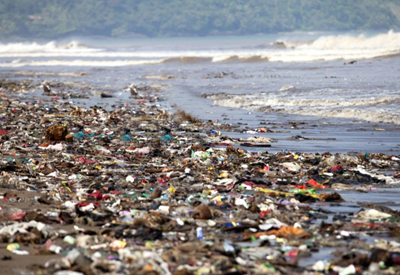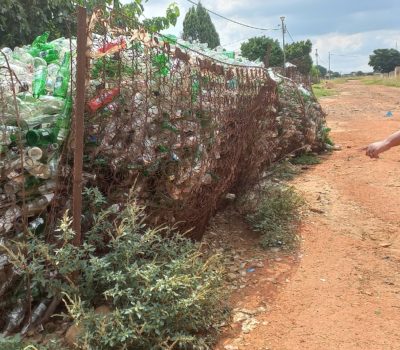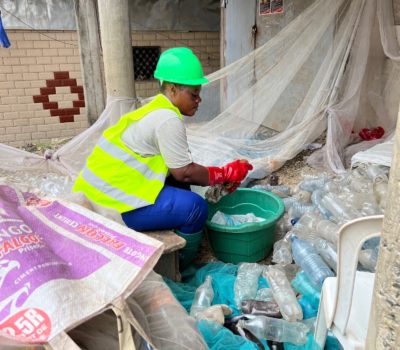Joining the Dots: Addressing the Climate Crisis Means Transformational Change
Thought Pieces
Author: Guest Author
Published: 27 June 2022
Addressing the climate crisis means transformational change across sectors, geographies, and the entire value chain, writes Zumo’s Environmental and Sustainability Advisor, Kirsteen Harrison. Zumo is a proud partner of WasteAid.
In the run-up to COP26, the climate crisis is dominating boardroom discussions around the globe, and the stakes are high – these are conversations that will determine our collective futures. Meaningful, coordinated commitments to far-reaching cuts in greenhouse gases are required across all sectors and countries, with a halving of greenhouse gas emissions required globally by 2030, and net zero by 2050 at the latest.
This calls for joined up thinking and action. As a technology company with a global outlook and sustainability at our core, at Zumo we recognise the part we have to play in that response – in our own sector and, just as importantly, through partnerships and as part of a collective effort towards decarbonisation that spans across sectors and the different facets of the climate crisis. We believe we have a huge challenge ahead of us, but also an enormous opportunity to play our part in creating a better future for all.
Decarbonising the crypto industry
Closest to home, Zumo is one of the early signatories to the Crypto Climate Accord (CCA), and we are working with the CCA to pilot innovative blockchain-based solutions to help drive decarbonisation of the sector. Although the crypto sector has understandably been criticised for the high levels of electricity consumption that some cryptocurrencies (most notably Bitcoin) are responsible for, we as an industry have a relatively straightforward journey ahead of us, compared to many other sectors that also need to reach net zero by mid-century.
This is due to the fact that, in crypto, there is a clear line of sight between the electricity consumed in mining, and the cryptocurrency supply generated as a result of that mining process. Whilst this high electricity consumption has drawn criticism from many, and the crypto sector has much work to do to clean up its act, the fact that mining equipment is not location sensitive means it can be set up where renewable energy sources are abundant. Electricity and mining equipment (similar to computer servers) are the only input and, technologically at least, we can transition to 100% renewable electricity relatively quickly. So, whilst there is much work left to be done, there is already a clear understanding of the impacts and what needs to be done to address these.
Embracing the wider picture
The same cannot be said for the waste sector, where the links between the climate crisis and waste are often poorly understood. In recent years, there has been much progress in this area, and WasteAid is at the forefront of communicating this important message and working with communities to develop low-cost solutions. This is one of the principal reasons why the Zumo team chose WasteAid as our charity partner – the climate crisis will not be sufficiently addressed by focussing on renewable energy alone, and we want to have as wide-reaching an impact as possible.
Looking beyond energy consumption
People tend to think of climate change as being caused primarily by the use of fossil fuels for energy, although the links between climate change, land use and food production is now better understood by many people. Even so, the links between the climate crisis and waste urgently need more attention – and the inconvenient truth is that we all need to look at what we consume. The Ellen McArthur Foundation estimates that 45% of our carbon footprint comes from the products we consume and use. This includes, for instance, food, clothes and electrical items, but also single use items such as food containers, shampoo bottles and drinks cans – all of which will end up as waste. To respond sufficiently to the climate crisis, we need to address our consumption habits, and by inference, the waste we produce.
Is recycling enough?
In the UK, we have a well-developed infrastructure to deal with our waste, and this has historically enabled us to adopt an ‘out of sight, out of mind’ approach. As long as we segregated our waste for recycling, we could sit in comfort knowing that we have ‘done our bit’. But doing our bit is no longer enough. Transformational change is required in the way we consume, and we need to quickly move to a more circular economy, where items stay in use for longer, are designed for easy repair and disassembly, and where leasing competes with purchase as the ownership model of choice.
In recent years, the UK waste industry has come under increased scrutiny for the carbon emissions associated with waste management practices, which include methane from landfill, and greenhouse gases (principally CO2) from the burning of residual waste to produce energy (energy from waste, or EfW). A clear link between the waste we produce, the way in which it is managed, and the respective greenhouse gas emissions in the UK was established long ago, but these figures were updated earlier in 2021 and show the full extent of this impact.
The Climate Change Committee (CCC), an independent, statutory body, estimates the UK waste sector was responsible for 4% of the UK’s greenhouse gas (GHG) emissions in 2019. Most of these emissions are due to the landfilling of waste (biodegradable waste decomposes in landfill to produce methane, a potent greenhouse gas). There has been a significant decline in emissions over the past two decades due to reductions in waste being landfilled, but little improvement in the past few years due to a plateau in UK recycling and significant growth in fossil emissions from EfW plants.
The CCC report looks only at the waste management activities themselves and not operational emissions associated with waste treatment, such as electricity usage. The Environmental Services Association (ESA) (the trade body representing the UK waste and resources sector) commissioned further work to inform its net zero strategy, which estimates the total contribution from the waste sector in the UK to be 8% of the UK’s GHG emissions. This includes the transport of waste, and electricity used to process waste. In line with the Greenhouse Gas Protocol, this does not include avoided emissions (i.e. the benefits of recycling as opposed to using virgin materials) and so the real picture is more complex than these figures suggest. In fact, the ESA’s research shows that the emissions avoided by recycling in the UK are three times greater than the emissions from the recycling processes themselves.
The need in the developing world
If the total climate contribution of waste management in the UK is as high as 8% of greenhouse gas emissions, what might the potential impact be in developing countries? After all, in developing countries the avoided emissions of recycling are much less significant, as there is not such a well-developed recycling infrastructure in place as there is in the UK.
In many cases, this lack of waste collection and recycling infrastructure means that the only options for getting rid of waste are to dump it – either in illegal dumpsites or watercourses – or to burn it. Often, burning on dumpsites is undertaken to reduce the volume and make way for more waste. All of these options have significant impacts for the climate crisis.
In countries where there may not be proper waste management processes in place, the impacts are more difficult to calculate. There is often little data on the composition of waste (a high percentage of fossil carbon, such as plastics, makes the climate impact much greater), or the fate of this waste (whether burned, dumped on land, or in dumped watercourses, eventually ending up in the ocean). It could be argued that the lack of collection infrastructure or recycling plants reduces energy consumption – there are likely to be less emissions associated with collection vehicles and recycling infrastructure than there are in the UK, for example. However, as we have seen above the avoided emissions due to such infrastructure, where it exists, is significant. In fact, the lack of such infrastructure leads to increased demand on raw materials, which also contributes to the climate crisis.
There is also an often overlooked but hugely significant difference in waste practices which means that the climate impact of waste practices in countries with little or no waste infrastructure are far more significant than many people realise. In the UK and other developed countries, when residual waste is burned, energy is produced from waste facilities. These are subject to strict emissions limits and, as such, are fitted with robust abatement equipment to remove pollutants. Particulates (dust) are removed along with other pollutants such as NOx (Nitrogen Oxide), SO2 (Sulfur Dioxide) and HCl (Hydrogen Chloride). With the open burning of waste there is no such abatement and toxic chemicals are released into the air. As well as being a health hazard for local communities, this releases particulates (soot, or black carbon), which is a significant contributor to the climate crisis.
Black carbon is the black smoke that is given off by a fire. When a fire burns relatively clean (for example, dry wood), there is less black smoke, but when plastics and tyres are burned, for example, the black smoke is significant. When waste is burned on a large scale, and the feedstock is uncontrolled, black carbon becomes significant in its contribution to climate change.
Black carbon stays in the atmosphere for a matter of days (compared to CO2, which stays in the atmosphere for hundreds of years), but can do significant damage in the time it remains airborne. The contribution to warming is 100 to 2,000 times more than that of CO2 on a 100-year timescale. The Global Waste Management Outlook estimates that around 10-15% of global greenhouse gas emissions could be reduced through improved waste management.
Why waste management matters
Climate resilience is particularly important when considering waste management. Poor waste management practices lead to discarded rubbish, blocking drains and waterways and leading to increased risk of flooding as weather patterns become more severe. Diverting food waste to use as compost regenerates degraded soils, improving water retention, and decreasing reliance on artificial irrigation.
Poor waste management practices in lower to middle income countries have long been associated with poor health outcomes, pollution, and lower standards of living. The links between waste management practices and climate change are slowly entering into the public consciousness, and the climate resilience of the countries that are likely to be most impacted by climate change may be compromised by poor waste practices.
Making the connections
Circling back to where we started, with cryptocurrencies and the crypto industry, although on the face of it blockchain technology and waste management may appear far apart, in reality they are both about empowering communities and creating sustainable livelihoods, at scale.
Blockchain and cryptocurrencies have the potential to be revolutionary in democratising finance, providing financial solutions to the world’s unbanked and reducing the cost of remittances to the world’s poorest countries. A borderless technology, cryptocurrency has the potential to help the poorest people in the world – and these are exactly the people who suffer the effects of poor waste management.
The link can be still more direct. While blockchain technology is only in its infancy, already we are seeing the emergence of blockchain applications that aim to tackle the waste management problem directly, leveraging blockchain technology as a tamper-proof record of provenance, a mode of incentivisation for environmentally friendly behaviours, and a high-tech way to provide the ledger of accountability for the world’s waste. It is just one strand of a range of emerging applications of ‘blockchain for good’, and how the technology could be applied to address world problems from poverty and hunger to education and governance.
Ultimately, whatever the angle we approach it from, whichever sector we happen to be in, what we agree on is that the climate crisis requires urgent action. For our part, we are proud to support WasteAid and raise awareness in this crucial area. As we approach the launch of our own Net Zero Strategy, we at Zumo will continue to work with the Crypto Climate Accord to ensure the crypto sector acts as an example to other sectors by showcasing what industry-wide decarbonisation looks like. And we will continue to work with partners wherever we can to ensure we are keeping sight of the bigger picture. The journey to a cleaner, more sustainable world is a journey we need to take together.
About the author
Kirsteen is Environmental & Sustainability Advisor to the Board at Zumo. She is a freelance environmental consultant with experience in many sectors including crypto, waste management, logistics and finance. Kirsteen is currently leading the development of net zero strategies at Zumo and several other companies. She is a stubborn optimist with a fierce conviction that businesses should be a force for good.























